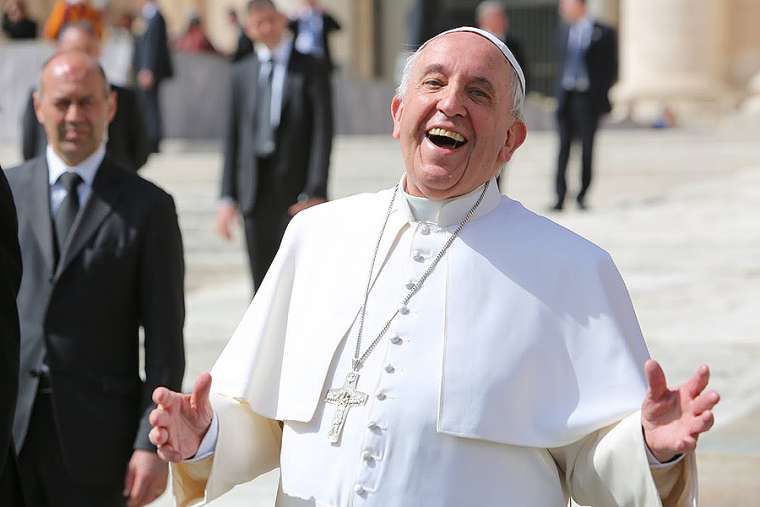Lesson 23: Pope Francis’ “Rejoice and Be Glad”
 As I read the Pope’s recent exhortation Gaudete and Exsultate, I was struck by how much it echoes our search for a modern Christian love narrative. Although he presents it as a call to holiness in today’s world, he repeatedly describes holiness as love. He writes, for instance, “Holiness is nothing less than love lived to the fullest” and “We are called to be holy by living our lives with love and by bearing witness in everything we do, wherever we find ourselves.” And as he begins his chapter “Five Signs of Holiness,” he acknowledges these are “five great expressions of love for God and neighbor that I consider of particular importance in the light of certain dangers and limitations present in today’s culture. There we see a sense of anxiety, sometimes violent, that distracts and debilitates; negativity and sullenness; the self-content bred by consumerism; individualism; and all those forms of ersatz spirituality – having nothing to do with God – that dominate the current religious marketplace.”
As I read the Pope’s recent exhortation Gaudete and Exsultate, I was struck by how much it echoes our search for a modern Christian love narrative. Although he presents it as a call to holiness in today’s world, he repeatedly describes holiness as love. He writes, for instance, “Holiness is nothing less than love lived to the fullest” and “We are called to be holy by living our lives with love and by bearing witness in everything we do, wherever we find ourselves.” And as he begins his chapter “Five Signs of Holiness,” he acknowledges these are “five great expressions of love for God and neighbor that I consider of particular importance in the light of certain dangers and limitations present in today’s culture. There we see a sense of anxiety, sometimes violent, that distracts and debilitates; negativity and sullenness; the self-content bred by consumerism; individualism; and all those forms of ersatz spirituality – having nothing to do with God – that dominate the current religious marketplace.”
You do not read very far until you realize the Pope is presenting a careful defense against those who attack him and Vatican II for placing pastoral concern above doctrine. He begins by critiquing two modern forms of Gnosticism and Pelagianism that he characterizes as enemies of holiness (love). You could quickly define Gnostics as those who think Christianity has more to do with the mind than the body, because Jesus gave the Church secret knowledge, and Pelagians as those who think they teach and practice absolute moral and spiritual laws that all people could know and perfect if they only tried. Both of these groups can hardly stand the Pope’s, “Who am I to judge?” The first thinks his primary responsibility is to teach correct theological doctrine and the second, natural moral law.
As you read further, you soon realize he is also carefully addressing our cultural problems. Many people feel the 2016 presidential election exposed a sick society when it forced them to vote for either an exploiter or an elitist. While censuring Gnosticism and Pelagianism as forms of church elitism, the Pope’s words also critique societal forms. When he writes, “When someone has an answer for every question, it is a sign that they are not on the right road,” he speaks to all those who absolutize their own theories and try to force others into their way of thinking.
In the second portion of his exhortation, Pope Francis claims the Beatitudes offer the way to true holiness and offers five special signs of love. In large part, he simply expands on his beloved counsel to “live gently.” He writes, “True wisdom is never separate from mercy towards neighbor” and “Mercy is the beating heart of the Gospel.” He speaks of holiness as not being afraid to reach out in compassion, not fleeing from situations of suffering, and knowing how to mourn with others.
Throughout the exhortation, the Pope makes clear Christianity is counter to the way things are often done in an institutionally-minded church or a throwaway capitalist society. Most of us share his concern that there is not enough care for the poor, the refugee, the elderly, the abandoned, and a host of other vulnerable suffering people in our world. Most of know that there is far too much violence not only on social media, but also in our homes, communities and world.
Salvation is certainly about God coming to save humanity from self-destruction. God shows us we are his beloved, so that we can begin loving ourselves in a healthy manner and consequently come to love others in the same fashion. This certainly is the way to overcoming the violence we inflict on others and ourselves. “Rejoice and be Glad” throws light on the path to that kind of salvation.

 Frontline Study is an online discussion of the scriptures, inviting you to share your comments and your reflections on each weekly topic. Simply click on the "Add Reply" text at the top of each post to see what others have posted and to add your thoughts.
Frontline Study is an online discussion of the scriptures, inviting you to share your comments and your reflections on each weekly topic. Simply click on the "Add Reply" text at the top of each post to see what others have posted and to add your thoughts.